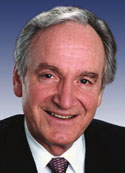Harkin on education bill: entering new era of partnership between states, fed
DES MOINES — A bill approved by the U.S. Senate’s education committee will replace No Child Left Behind with legislation that’s less “prescriptive and punitive” and allows school districts more freedom in deciding how best to educate and evaluate children, says U.S
Jul 31, 202068K Shares1.1M Views
Image has not been found. URL: http://media.iowaindependent.com/harkin_help_500.jpg
DES MOINES — A bill approved by the U.S. Senate’s education committee will replace No Child Left Behind with legislation that’s less “prescriptive and punitive” and allows school districts more freedom in deciding how best to educate and evaluate children, says U.S. Sen. Tom Harkin (D-Cumming).
Harkin, the chairman of the Senate Health, Education, Labor and Pensions Committee, presented the bill to educators and members of the press at the Downtown School in Des Moines on Friday. The Elementary and Secondary Education Reauthorization Act of 2011 is the first such reauthorization since No Child Left Behind was enacted in 2001.
Tom Harkin
“We are entering a new era of a partnership between the federal government, the state and local school districts,” Harkin said.
NCLB did some good things, Harkin said, like disaggragating data and focusing on achievement of subgroups. But overall it “tried to do too many things,” while this bill aims to do fewer things and do them better.
“Rather than covering all schools we have left it back to the states within certain parameters to set up their accountability systems and performance targets, and yes, to set up teacher and principal evaluation systems,” Harkin said.
Nancy Sebring, the superintendent of Des Moines Public Schools, praised NCLB for improving schools’ focus on under-served children. But she also said the law has had other consequences “that were not very productive for schools.”
“There were punitive measures that were embedded in the act that in some cases demoralized our teachers, in some cases inappropriately punished our schools and the people in them and the children in them for not being successful,” Sebring said. “We know that that kind of aspect of the law has been somewhat damaging to public schools.”
Under the bill, the federal government will focus on helping the bottom 5 percent of schools in each state and addressing achievement gaps. It also eliminates “adequate yearly progress” requirements and federal sanctions that create pressure to teach to tests.
Harkin said the bill also puts more power into the hands of states and school districts to prepare students for college and a career, and promotes arts, music and physical education.
“There’s no one specific way of teaching kids that’s better than every other possible way,” Harkin said. “It varies, and we learn new things as we experiment and try different things. So we want local school districts to have the freedom to try different methodologies of teaching, to give them the freedom to do that.”
Harkin said the bill is unlikely to be debated by the full Senate until next year, but he’s hopeful it will pass the Senate and the U.S. House will come up with a similar effort. The Senate’s version passed out of committee with bipartisan support.

Rhyley Carney
Reviewer
Latest Articles
Popular Articles
